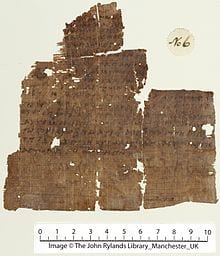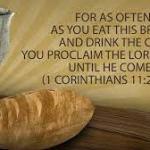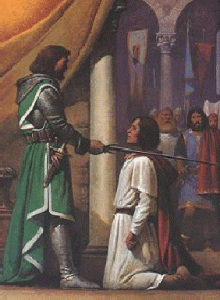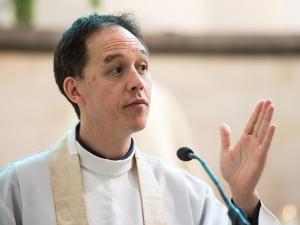
God is in the process of creating a new world in the midst of the world that we humans have constructed. The Creed, which Catholics and other Christians recite every Sunday, is the sign that points to that world.
This is the delayed continuation of the series on the Mass. People who know me know some of the reasons why I haven’t written for a while. These are the earlier posts in this series:
- The Mass: Is it Still the Same?
- Introductory Rites: Please, Stand for Some Important Work
- Liturgy of the Word: More than Listening
- Liturgical Reform and This Series Amid Contrary Views
- The Creed: A Story, Not an Essay
I introduced a visitor from space in these posts and imagined her thoughts on experiencing the Mass. An astute observer, she is struck by details that those who have grown familiar with the Mass take for granted. Now she looks around at all the people, casually uttering the world-shattering words of the Creed. She’s amazed. Do they even know what they’re saying?
The transition
The Creed deserves a series of its own, but here I’m particularly interested in its function in the Mass. It stands at the juncture of the two main parts of the Mass, the Liturgy of the Word and the Liturgy of the Eucharist. This is the point where those seeking membership in the Catholic Church, leave the assembly. They have experienced the part of the Mass that resembles the ancient Jewish synagogue service. It reminds one of two other transitions. An individual goes from outside the Church to inside during the Easter Vigil. The Church itself grew out of its Jewish roots as a result of its experience of Jesus’ resurrection.
The Church moved from the Kingdom of God in anticipation to a first hazy glimpse of that Kingdom. Either position calls the world into question. When we recite the Creed at Mass it’s like we’re reliving the transition Jews and Christians both made from the kingdom of this world to the Kingdom of God.
The Creed, a story, not an essay
My space visitor possesses a basic knowledge of English, including its Latin derivatives, like Creed. She’s expecting a summary of the things the Catholic Church expects its members to believe. Maybe that’s what most Catholic think they are reciting. If so, that would explain how we can say these words without trembling. We’re not taken aback, as she is, to find that the Creed is actually a story. And from the first “I believe” to the fourth and last and with words like “confess” and “look forward” at the end, we put ourselves into that story.
Eventually in its history, the Church had to try to hold together rationally the Jewish emphasis on one God and its own experience of the Trinity of Father, Son, and Spirit. The Creed doesn’t do that. In the first part it echoes the Jewish “Hear, O Israel, the Lord is one.” And moves on without hesitation to Jesus Christ and the Holy Spirit in paragraphs two and three. The Creed doesn’t try to convince us as an essay in theology might.
Not one of the world’s stories
The Creed makes a much stronger claim on us than even a persuasive argument would. The Creed asks the believer to admit he or she is in a story. In the modern world there are many stories like items on the shelf of our great consumer society. We are, perhaps, the only people ever that imagined they could choose their story. Or return it and exchange it for another. When we say the first words of the Creed, “I believe,” we say NO to the world’s first idol – unrestrained freedom of choice. In particular, freedom of choice doesn’t extend to the things one believes.
What about the person who changes stories? Let’s say an atheist converts to the Catholic faith. It may seem like a choice, but it would be an odd sort of choice. It’s more like being drawn toward something that turns out to be hard to avoid. You can use your freedom of choice to resist that attraction. You can stay away from places, people, and sources of information that increase the danger of “falling.” Or, you can follow the path that seems to beckon. When you get to the end, that last step seems less like a choice than the end of a process of being chosen. In theology we call that grace.
Challenging the world’s idols
When we say the Creed, we admit that we belong to a story that we didn’t exactly choose. That sets us apart from one of the world’s idolatries. But a closer look shows the Creed challenging more idols. We claim God as creator of all things visible and invisible. There can be no proprietary ownership in this world because all is gift. There are no self-made men or women. We too are God’s gifts.
Next we claim Jesus as savior, thus admitting that we need saving, not just a do-it-yourself adjustment. We claim God as one who speaks to us through prophets, including, among many others, the unworthy messengers we know as Church.
In its last sentence the Creed has us look forward to a new world. Not an alien world, like the one our space visitor comes from. But not a natural or human-crafted progression from the way things are now, either. The Church has seven decades of being at peace with the scientific theory of evolution. For longer than that the Church has recognized the legitimacy of world governments and secular history, where it finds itself one actor among many. But the Creed’s last sentence has us put in their proper, but lesser, place both science and human affairs. We look forward to God’s reign.
The Creed doesn’t say all that the Church believes. It does say what identifies Christians and makes them like space aliens—making a home in this world, but not exactly at home.
Image credit: Wikipedia












